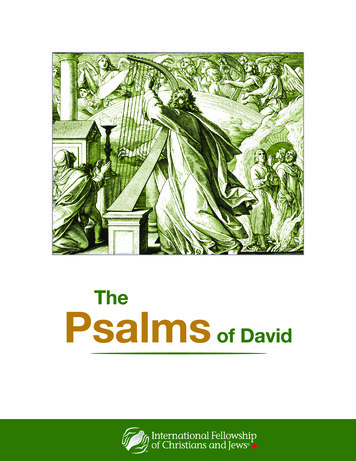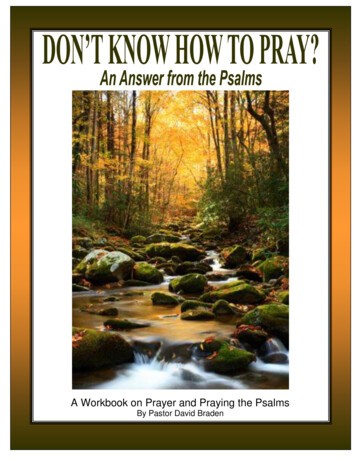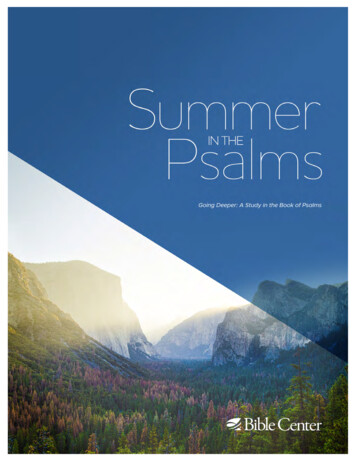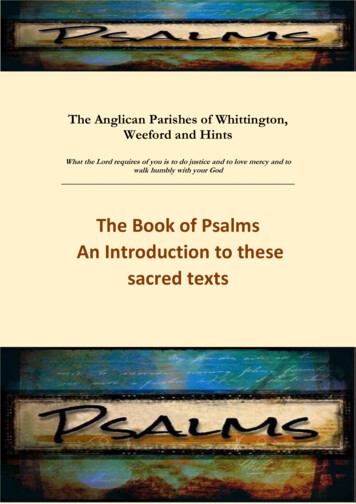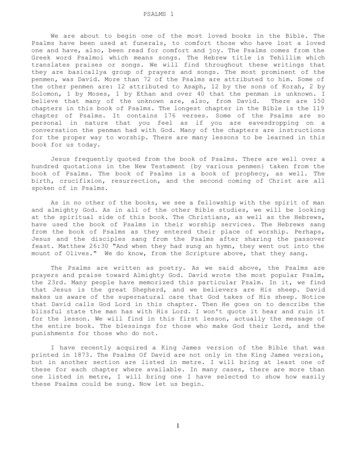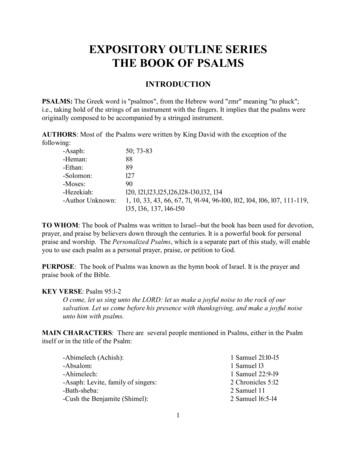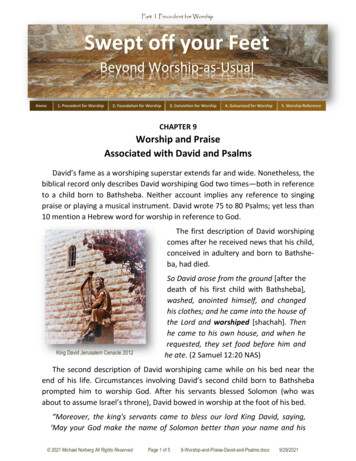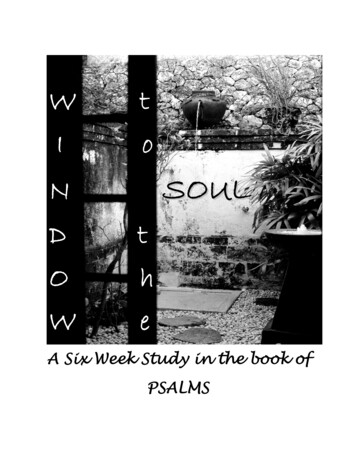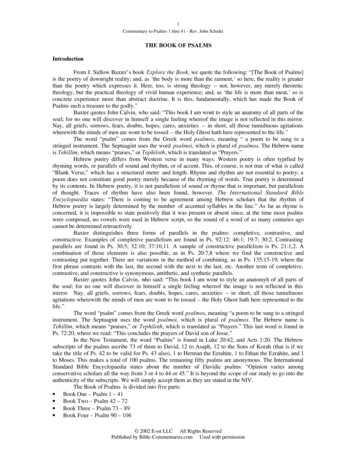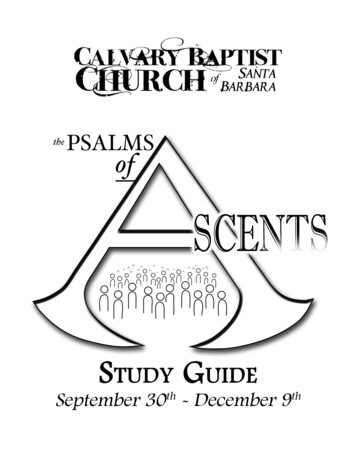
Transcription
The Psalms of AscentsCalvary Baptist Church of Santa BarbaraSeptember 30 –December 9, 2012Study1.2.3.4.5.6.7.8.9.10.11.PassagePsalm 120Psalm 121Psalm 122Psalm 123Psalm 126Psalm 127Psalms 128 & 134Psalm 129Psalm 130Psalm 131Psalm lessingPerseveranceHopeHumilityCommunitySermon DateSeptember 30October 7October 14October 21October 28November 4November 11November 18November 25December 2December 9This study guide has been written to help us study the Scriptures on our own beforewe hear the sermon on Sunday. The questions are designed to get us thinkingdeeply about Scripture. I encourage you to join a Fellowship Group through CBCor meet together with a friend or two to discuss your responses to the questions andyour reflections upon the text. I pray that it will be a rich time of deeply exploringthe truths of Scripture and that by doing so you will be transformed more and moreinto the image and likeness of Jesus our Lord.Special thanks to Daniel McDavid for the artwork and to Bethany Miller for finaledits.
SOURCES/ABBREVIATIONSBoiceJames Montgomery Boice, Psalms, vol. 3, (Baker, 1998).DeverMark Dever, The Message of the Old Testament: PromisesMade, (Crossway, 2006).ESVThe English Standard Version of the Holy Bible, (Crossway,2002).KidnerDerek Kidner, Psalm 73-150, (Inter Varsity, 1973).LaSorWilliam LaSor, David Hubbard, Frederic Bush, Old TestamentSurvey, (Eerdmans, 1996).LewisC. S. Lewis, Reflections on the Psalms, (Harcourt, 1958).LongmanHow To Read the Psalms, (Inter Varsity, 1988)NIVThe New International Version of the Holy Bible, (Zondervan,1984).PetersonEugene Peterson, A Long Obedience in the Same Direction:Discipleship in an Instant Society, (Inter Varsity, 2000).VanGemerenWillem A. VanGemeren, Psalms, in The Expositor’s BibleCommentary vol. 5, F. E. Gaebelein, ed. (Zondervan, 1991)All Scripture references are taken from the English Standard Version of the HolyBible unless otherwise noted.
CALVARY BAPTIST CHURCH OF SANTA BARBARAPSALMS OF ASCENTSINTRODUCTION TO THE PSALMS OF ASCENTSPilgrimsPilgrimage. The word brings to mind many different images. Much of our country’sheritage was established by pilgrims who fled religious persecution in England. Elvisfans make their pilgrimages to Graceland, Elvis’ home in Memphis. In every majorreligion, annual pilgrimages — trips to sacred places — are undertaken by the faithful:Muslims to Mecca, Jews (and many Christians) to Jerusalem, and Catholics to theVatican in Rome.Pilgrims are not nomads. Like pilgrims, nomads are on the move, carrying their homeswith them, following their herds or pursuing new markets for their handiwork. But unlikepilgrims, nomads are simply wanderers with no final destination. Wherever they makecamp is home for the time being. Pilgrims, on the other hand, have a destination in mind;their journey has a purpose. Pilgrims are restless to reach their journey’s end. They presson and don’t linger too long in any one place.This fall we will be focusing on this theme of pilgrimage. The image of a pilgrimage hasoften been used as a metaphor for the Christian life. As Christians, we recognize that weare on a pilgrimage. This world is not our true home and therefore we should never gettoo cozy here. “For here we have no lasting city, but we seek the city that is to come.”1We are “looking forward to the city that has foundations, whose designer and builder isGod.”2Pilgrims bound for their destination, adding to their numbers as they go, often find thatthe journey itself is part of the experience. This is also true for Christians. We arelearning and growing as we go. Catherine of Siena wrote, “All the way to heaven isheaven, for has He not said, ‘I am the Way’?”Songs of AscentsOur texts will come from a group of Psalms called the Songs of Ascents. These are songsthat were used by Jewish pilgrims as they made their way to Jerusalem for the threeannual festivals — Passover, Pentecost, and the Day of Atonement.The title Song of Ascents is the Hebrew phrase shir hama’aloth. The first word, shir,means hymn or song. The second word, ma’alah, means both a step (or stair) and a goingup.3 Going up is often used in the Bible to refer to going up to Jerusalem. Joseph andMary would probably have sung these psalms as they went up to Jerusalem with theyoung Jesus. Jesus and His disciples would have sung them as they went up for the feasts.This reminds us that the life of the disciple ought to be one of ever increasing maturity. Itought to be an upward, Godward life, ever advancing from one level to the next.1Hebrews 13:14Hebrews 11:103Boice, 1068.2PAGE 1
CALVARY BAPTIST CHURCH OF SANTA BARBARAPSALMS OF ASCENTSThe content and themes of the Songs of Ascents focused the pilgrims’ minds on thepurpose of their journey and prepared their hearts to worship God when they reachedJerusalem. In the same way, the themes of these songs can help us on our pilgrimage.They can help us press on when we grow tired. They can inspire us when we are temptedor feel discouraged. Above all, they can keep us focused on the God who is at the heart ofour true home and who is also with us on the journey.DiscipleshipEugene Peterson wrote a wonderful book based on the Psalms of Ascents entitled A LongObedience in the Same Direction. Peterson chose a particularly striking subtitle,Discipleship in an Instant Society. He points out that these psalms communicate apowerful message in our “instant society.” He writes,It is not difficult in such a world to get a person interested in the message of thegospel; it is terrifically difficult to sustain the interest. Millions of people in ourculture make decisions for Christ, but there is a dreadful attrition rate. Many claimto have been born again, but the evidence for mature Christian discipleship isslim. In our kind of culture anything, even news about God, can be sold if it ispackaged freshly; but when it loses its novelty, it goes on the garbage heap. Thereis a great market for religious experience in our world; there is little enthusiasmfor the patient acquisition of virtue, little inclination to sign up for a longapprenticeship in what earlier generations of Christians called holiness.4The pilgrimage of the Christian is a pilgrimage of discipleship. As James Boice puts it,these are “discipleship songs.”5 Disciples spend their lives as apprentices to their master.Christians spend their lives as apprentices to their master, Jesus Christ.Boice goes on to write, “Christianity is a long-obedience religion, and if we do not knowthat about it, we know very little about Christianity. In fact, if we are not in it for the longhaul, we are not even Christians.”6ToolsAs we study these psalms we will receive indispensable tools to help us in our pilgrimageof discipleship. Here are a few:Prayer. The Psalms provide patterns for prayer. Eugene Peterson writes, “I knew thatfollowing Jesus could never develop into a ‘long obedience’ without a deepening life ofprayer and that the Psalms had always been the primary means by which Christianslearned to pray everything they lived, and live everything they prayed over the longhaul.”7 It is no wonder that the Psalms were considered Israel’s prayer book. As we studythese psalms, let us not forget to also pray them.4Peterson, 12.Boice, 1068.6Ibid.7Peterson, 12.5PAGE 2
CALVARY BAPTIST CHURCH OF SANTA BARBARAPSALMS OF ASCENTSWorship. The Psalms also provide patterns for praise. They were Israel’s hymn book.The title of the book of Psalms is taken from the Greek translation, Psalmoi. This comesfrom psallo, which means “to pluck,” used first for the playing of a stringed instrument oreven for the instrument itself. Later, the word was used to describe a song (psalmos) or acollection of songs (psalterion). The actual Hebrew title is tehillim — “praises” or“songs of praise.”8 As Tremper Longman writes, “The Psalms are a kind of literarysanctuary in the Scripture.”9Expression. The Psalms reflect the emotional responses of believers as they encounterthe mysteries of God’s ways. They give dynamic expression to deep faith. John Calvinlikened the Psalms to a mirror of the soul:There is not an emotion of which anyone can be conscious that is not hererepresented as in a mirror. Or rather, the Holy Spirit has here drawn to the life allthe griefs, sorrows, fears, doubts, hopes, cares, perplexities, in short, all thedistracting emotions with which the minds of men are wont to be agitated.10Poetry. The Psalms (in general) are considered poetry. Poetry, while difficult, is a richand textured way to communicate. In the Psalms we encounter: Parallelisms — Parallelisms refer to the way one phrase in the poem interactswith the phrase which follows it. For example: “O Lord, do not rebuke me in youranger” is followed with, “or discipline me in your wrath.”11 Imagery — God is personified as a “rock,”12 “fortress,”13 “shield,”14 and“shepherd,”15 to name but a few of the images employed in the Psalms. Simile — Similes use images to paint a picture for the reader through comparison.“As the deer pants for streams of water, so my soul pants for you, O God.”16 Metaphor — A metaphor is similar to a simile, but more explicit and clear. “Toyou I call, O Lord my Rock.”17The language of poetry is not always as clear as literal language, but it neverthelesscommunicates in a way that normal prose cannot. It enables us to explore God’s natureand our relationship with Him in ways not otherwise available to us.8LaSor, 430.Longman, 12.10Cited in Longman, 76.11Psalm 38.12Psalm 62.13Ibid.14Psalm 28.15Psalm 23.16Psalm 42.17Psalm 28.9PAGE 3
CALVARY BAPTIST CHURCH OF SANTA BARBARAPSALMS OF ASCENTSRelationshipThe Psalms are declarations of the relationship between God and His people. Thepsalmists cling to God’s covenant promises of provision, protection, and preservation.What we find in the Psalms is not a neat and tidy systematic theology, but rathertheological reflections on the relationship of God to His people. As C.S. Lewis points out,“The Psalms are poems, and poems intended to be sung: not doctrinal treatises, nor evensermons.”18Whether songs of adoration, confessions of sin, protests of innocence, complaints aboutsufferings, pleas for deliverance, assurances of being heard, petitions before battle, orthanksgivings afterwards, the Psalms are all expressions of the unique relationshipbetween the one true God and His people.As we read and study the Psalms of Ascents we will learn about both God and ourselves.Our emotions will be touched, our minds informed, and our wills moved. Over the next11 weeks, may these Psalms penetrate our souls and make us fit for the journey.18PAGE 4Lewis, 10.
CALVARY BAPTIST CHURCH OF SANTA BARBARAPSALMS OF ASCENTSSTUDY ONE: PSALM 120REPENTANCEThis seems like a strange place to start. Psalm 120doesn’t speak of going on a pilgrimage. It does,however, express the feelings of homesick peoplesettled in a strange land. Thus the tone is set for ajoyful upward journey in the psalms that follow.Read Psalm 120. Write down any initial thoughts,impressions or questions you have from the passage.1. How does the psalmist describe his culture? How does he deal with his frustrationswith his culture?2. In what specific ways do you see some of these same issues in modern Americanculture? How do you deal with your own frustrations with things in our culture thatare not as they should be?James Boice finds two things that bother the psalmist: lying neighbors (verses 1-4) andhostile neighbors (verses 5-7). He writes, “Thus, the starting place for our spiritualpilgrimage is seeing the world for what it is in order to turn from it.”19 Pilgrims arepeople who are dissatisfied with the way things are and therefore are on their way tosomeplace better. Peterson writes, “The usual biblical word describing the ‘no’ we say tothe world’s lies and the ‘yes’ we say to God’s truth is repentance.”201920Boice, 1070.Peterson, 29.PAGE 5
CALVARY BAPTIST CHURCH OF SANTA BARBARAPSALMS OF ASCENTS3. What are some of the lies that the world tells us? How have you responded to them?4. Have you said “no” to the lies of the world and “yes” to God’s truth? Have you askedfor God’s deliverance as the psalmist has in verse 2? Do you need to do so today?Right now?Take some time, in prayer, to ask God to deliver you from lying lips and a deceitfultongue. Here is a sample prayer from Eugene Peterson:Rescue me from the lies of advertisers who claim to know what I need and what Idesire, from the lies of entertainers who promise a cheap way to joy, from the lies ofpoliticians who pretend to instruct me in power and morality, from the lies ofpsychologists who offer to shape my behavior and my morals so that I will live long,happily and successfully, from the lies of religionists who ‘heal the wounds of thispeople lightly,’ from the lips of moralists who pretend to promote me to the office ofcaptain of my fate, from the lies of pastors who ‘leave the commandment of God, andhold fast the traditions of men’ (Mark 7:8). Rescue me from the person who tells meof life and omits Christ, who is wise in the ways of the world and ignores themovement of the Spirit.215. How have you witnessed the hostility of the world around you? How have you been ahostile neighbor?21PAGE 6Peterson, 27.
CALVARY BAPTIST CHURCH OF SANTA BARBARAPSALMS OF ASCENTSMeshech and Kedar, mentioned in verse 5, are names of people groups. The Meshech arepeople who lived in northern Turkey and later pushed north and east of the Black Sea intothe Caucasus, Kasakastan and Ukraine. Kedar, named after a son of Ishmael22, refers to awild Arab tribe in the desert.23 These people groups lived so far apart that the referencescan only be taken as “a general term for the heathen.”24 They are examples of the warliketribes among whom the pilgrim singers of Psalm 120 were dispersed.6. Have you settled down in Meshech or Kedar? If so, how? Why? Or do you have nolasting or real home here and is your real home in heaven? If so, how are you livinglife as a pilgrim among lying and hostile neighbors?7. What advice does Peter offer in 1 Peter 2:11-12?8. When we make a decision to turn from our current way of seeing the world andfollow God’s way, what hope can we find in Psalm 120 that God will help us?9. In what ways have you experienced God’s help as you’ve made decisions to followHis way?22Genesis 25:23.Isaiah 21:16-17; Jeremiah 49:28-29.24Kidner, 430-431.23PAGE 7
CALVARY BAPTIST CHURCH OF SANTA BARBARAPSALMS OF ASCENTSSTUDY TWO: PSALM 121PROVIDENCEThe pilgrim moves along on his journey in Psalm121, which spurs this reflection on the Providence ofGod.Read Psalm 121. Write down any initial thoughts,impressions or questions you have from the passage.1. Have you ever been on a long, difficult, or unsafe journey? What was it like?Most scholars consider this psalm to be a reflection during a pilgrimage to Jerusalem,which in Old Testament times was a strenuous, dangerous trek. The terrain was rocky andhilly, and many pilgrims would be traveling from lowland plains up into the hills whereJerusalem is located. For protection from bandits and wild animals, people throughouthistory have looked to higher sources of power. Once, every high hill had a shrine to adifferent deity, and people also worshiped and prayed to celestial objects like the sun andthe moon.As you read this psalm, examine the poetry and the craftsmanship of the words. Much ofPsalm 121 follows a popular pattern in psalm-writing — that is, “A, what’s more, B.” Forexample, verse 3: “He will not let you stumble and fall; (what’s more), the one whowatches over you will not sleep.”PAGE 8
CALVARY BAPTIST CHURCH OF SANTA BARBARAPSALMS OF ASCENTS2. Ask yourself along with the opening verse of the psalm, “Am I expecting my helpfrom the high places of this world, or am I relying on the true Maker of Heaven andEarth?” Where do you look for guidance and protection when the pilgrimage of yourlife is difficult?In verses 3-8, the “you” is actually singular in the Hebrew, which indicates that this is aninward meditation. Rather than addressing some group of pilgrims or a congregation, thepsalmist is talking to his own soul. This can also be seen in Psalm 42:5-6: “Why are youcast down, O my soul, and why are you in turmoil within me? Hope in God; for I shallagain praise him, my salvation and my God.”3. How does it make you feel to know that God, who watches over you, never sleeps?What if we worshiped a God who got careless or had to take naps — would you feelsafe in dangerous situations if that were the case?4. What kind of things are you in need of protection from today? Read through verses 58 again and replace the sun and moon with obstacles and dangers in your own life,spiritual or physical.This psalm highlights what is known as God’s “providence,” that is, that the God whocreated the universe is involved in our everyday lives to keep us and watch over us — notby preventing us from experiencing trouble, but by equipping us with what we need towithstand it and grow through it. As Christians today, we can know that involvementeven more intimately through Jesus Christ.5. How does your relationship with Jesus affect the way you read and sing this psalm?PAGE 9
CALVARY BAPTIST CHURCH OF SANTA BARBARAPSALMS OF ASCENTS6. Where are you today in the pilgrimage of life? Are you crying out for protection,resting in safety, or maybe catching a glimpse of Jerusalem?7. Think about a time when you faced major trials or temptations. Did you ask God toprovide you with His providence, and did He give you what you needed to withstandand be faithful in obedience?Even during this study, don’t forget that the Psalms are songs and prayers, not lecturesand sermons. Take time to sing them (or read them in a sing-song voice) to yourself or toa loved one, meditate on them and see if they speak to your own soul. Enjoy the poetry,the images, and the insights it can give you about the Lord.8. Consider the following verses on providence. How do these texts help you to furtherunderstand God’s provision for your life?PAGE 10 Genesis 45:5-8 1 Samuel 2:6-9 Psalm 91:4 Matthew 6:28 Matthew 10:29-31 Luke 21:32-36 Acts 17:26-28
CALVARY BAPTIST CHURCH OF SANTA BARBARAPSALMS OF ASCENTSSTUDY THREE: PSALM 122WORSHIPIn Psalm 120 the pilgrims are in a foreign land,beginning to turn their faces toward God’s city. InPsalm 121, the city is in sight and they are very nearto the end of their journey. In Psalm 122, the travelersare filled with joy as they step foot in the holy city.The title tells us that this psalm was written by David.Here, David paints a picture of corporate worship reminding us that there is something tolook forward to when God’s people come together to worship Him. It also assures us thatpraising God together will transform our community.Read Psalm 122. Write down any initial thoughts, impressions or questions you havefrom the passage.1. Many of us know that church membership has been declining in America. Yet goingto church is still one of the most popular weekend activities in our country. What doyou think are some of the reasons people decide to go to worship? Why do you go (ornot go)?2. In the first two verses of Psalm 122, David expresses delight at the thought of goingto the Temple to worship God. Why do you think he is so excited?PAGE 11
CALVARY BAPTIST CHURCH OF SANTA BARBARAPSALMS OF ASCENTS3. In worship our attitude is very important. How would you describe the attitude of theworshiper in Psalm 122?4. When you come to church on Sunday mornings, what distracts you from entering intoworship with the right kind of attitude? What can you do to prepare your heart forworship before you come?Regarding verse 3, Eugene Peterson notes:The King James Version translates this sentence, “Jerusalem is builded as a city thatis compact together.” Earlier, Coverdale had translated the latter phrase as “that is atunity with itself.” The city itself was a kind of architectural metaphor for whatworship is: All the pieces of masonry fit compactly, all the building stones fitharmoniously. There were no loose stones, no leftover pieces, no awkward gaps in thewalls or towers. It was well built, compactly built, skillfully built, “at unity withitself.”255. How do you think this metaphor relates to the experience of corporate worship?6. Verse 4 describes the anticipation of joining the entire nation to worship God. Whatare the benefits of a community having a common time and place of worship?25Peterson, 52.PAGE 12
CALVARY BAPTIST CHURCH OF SANTA BARBARAPSALMS OF ASCENTSThe second half of the psalm, beginning at verse 6, is a call for peace in the city andamong the people of Jerusalem. Eugene Peterson writes:Shalom, peace, is one of the richest words in the Bible. . It gathers all aspects ofwholeness that result from God’s will being completed in us. It is the work of Godthat when complete, releases streams of living water in us and pulsates with eternallife.267. Why is the desire for this kind of peace a natural outcome of true worship?8. David’s heart for worship led him to pray for the peace of Jerusalem. What are somespecific prayers that you could pray for the peace of our worshiping community atCalvary Baptist Church?Eugene Peterson writes:Worship, even for those who are most faithful at it, takes up just a small percentage ofa person’s life, an hour or so a week at most. Does it make any difference to the restof the week? The final words of Psalm 122 say that it does. Here we have theprayers that overflow the bounds of worship and create new relationships in the city,in society.279. Worship ought to spill out into our everyday life. What are some things you might tryto help carry Sunday’s experience of worship into the rest of the week?2627Peterson, 56-57.Ibid, 55-56.PAGE 13
CALVARY BAPTIST CHURCH OF SANTA BARBARAPSALMS OF ASCENTSSTUDY FOUR: PSALM 123SERVICEThe author of Psalm 123 calls out to God with anattitude of expectant servanthood. As the pilgrimsdraw closer to the Temple, the song exhorts them tokeep their eyes fixed upward on the God in whosemercy they trust.Read Psalm 123. Write down any initial thoughts,impressions or questions you have from the passage.1. In verse 1, the psalmist refers to God as “you who are enthroned in heaven.” Howdoes that description add to the psalmist’s plea? What does it tell us about his posturebefore the Lord?James Boice calls Psalm 123 “a psalm for the eyes.” He notes that the word “eyes”occurs four times in verses 1 and 2. Each usage is accompanied by one of two phrases:“lift up” (once) or “look to” (three times). Like the author of Hebrews, who exhorts us to“fix our eyes on Jesus,”28 the psalmist acknowledges that our gaze reflects the desires ofour heart.29Charles Spurgeon warns, “We must use our eyes with resolution, for they will not goupward to the Lord of themselves, but they incline to look downward, or inward, oranywhere but to the Lord.”3028Hebrews 12:2, NIV.Boice, 1089.30Cited in Boice, 1089.29PAGE 14
CALVARY BAPTIST CHURCH OF SANTA BARBARAPSALMS OF ASCENTS2. Consider the following list of words that Spurgeon uses to describe how we asservants should look to our master. Do they characterize how you look to pectantlyImploringlyAttentivelySingly3. Verses 3 and 4 describe the psalmist’s motivation. What is he seeking? Why? Canyou relate to his struggle?4. In study 2, we were introduced to a common form of parallelism in Hebrew poetry:“A, what’s more, B.” Reflect on this pattern as you read verse 4. How does therepetition in the latter part of the verse add to our understanding? In what way iscontempt different from scorn or ridicule?Consider the following quote by Eugene Peterson:Too often we think of religion as a far-off, mysteriously run bureaucracy to whichwe apply for assistance when we feel the need. We go to a local branch office anddirect the clerk (sometimes called a pastor) to fill out our order for God. Then wego home and wait for God to be delivered to us according to the specificationsthat we have set down.3131Peterson, 62.PAGE 15
CALVARY BAPTIST CHURCH OF SANTA BARBARAPSALMS OF ASCENTS5. Compare this description with Psalm 123. How is it different? What do these twoexamples reveal about the nature of your own prayer?6. The psalmist is describing his service to God. Does this passage tell us anything aboutserving others? How does it relate to John 13:12-17?7. In commenting on Psalm 123, Peterson remarks that “a servant Christian is the freestperson on earth.” What do you think he means? In what way does servanthood grantus freedom?PAGE 16
CALVARY BAPTIST CHURCH OF SANTA BARBARAPSALMS OF ASCENTSSTUDY FIVE: PSALM 126JOYPsalm 126 is a pilgrim song of joy. It also teaches usabout the reasons for our joy. It teaches us that wecan experience joy even in difficult circumstances. Itlooks back to God’s deliverance and forward to afuture where God continues to bless His people.Read Psalm 126. Write down any initial thoughts,impressions or questions you have from the passage.This psalm coincides with the period of Israel’s history after a period of exile. As thepsalm opens, the Jewish people return to their homeland, against all odds. But they arefaced with the monumental task of rebuilding. This period of Israel’s history is recordedin the books of Ezra and Nehemiah.1. In verses 1-3, how does the psalmist describe the feelings of the people? Why do youthink they were so stunned by this experience?2. The second half of the psalm looks to the future. What things does the psalmist expectthe future to bring? Are they all good things? Would you describe the tone of thissection as optimistic or pessimistic? Why?PAGE 17
CALVARY BAPTIST CHURCH OF SANTA BARBARAPSALMS OF ASCENTS3. According to the psalmist, what role will God play in Israel’s future prosperity? Whatis the role of the people of God?The farming imagery throughout this psalm shows us that it is not our efforts thatultimately contribute to our blessing, any more than the farmer can make the seed grow.But if the farmer is not obedient to God’s natural laws — even when the task is difficultand filled with tears — there will be no harvest. Often the Lord works miracles oftransforming blessing within the context of the obedience of His people.4. In this psalm, what is the relationship between joy and sorrow?5. Examine each occurrence of the word joy in this psalm. In each case, what hasbrought joy? What part does God play in each case?The Negev, mentioned in verse 4, was a network of shallow ditches that were dry formost of the year. Sudden rains would turn them into gushing streams and bring a burst ofcolor as flowers sprang up.6. What does this image convey about what sometimes happens in our spiritual lives?Have you had a sudden experience of God’s blessing in the middle of a dry time inyour life? What happened?PAGE 18
CALVARY BAPTIST CHURCH OF SANTA BARBARAPSALMS OF ASCENTS7. In the opening verses of the psalm, the people were amazed at what God had donebecause it had come so suddenly after a very long period of waiting; they had begunto lose hope and then God acted. What things can cause you to lose hope in God or tolower your expectation of what God can do?8. Psalm 126 shows us that recalling what God has done in the past can give us a greatersense of joy and confidence as we face the future. Are there times in your life whenyou experienced God’s provision in a special way? How are those times anencouragement as you face new challenges?PAGE 19
CALVARY BAPTIST CHURCH OF SANTA BARBARAPSALMS OF ASCENTSSTUDY SIX: PSALM 127WORKAfter a long, hard journey, the pilgrims arrive at theirdestination and consider the value of all their work.Read Psalm 126. Write down any initial thoughts,impressions or questions you have from the passage.1. Have you ever felt like all the hard work you do in this life is in vain? Explain.Scholars have varied opinions on the original setting for this Psalm. Eugene Petersonimagines a group of pilgrims arriving at Jerusalem and boasting about how much workthey went through to arrive at the Temple. Perhaps they were looking for bragging rights:“I got here faster!” “I brought more friends with me!” or “I came the farthest!” Then, inthe midst of this prideful competition, somebody would start singing this psalm with“Unless the Lord builds the house ”Other scholars and commentators consider this a perfect psalm for singing and praying atthe birth of a child or the dedication of a new building. The prayer in this case would benot only for guidance and building but also for continued protection and blessing.2. Think about what motivates you when you work, whether you have a full-time orpart-time job, do volunteer work, raise a family full time, or go to school. Are youapproaching your work as a means to accumulating wealth, possessions, knowledge,and stature? What motivates you to work?PAGE 20
CALVARY BAPTIST CHURCH OF SANTA BARBARAPSALMS OF ASCENTSThe sin of the Tower of Babel was not the building project itself, but rather the attitudethat the builders had, that they did not need God’s approval or guidance; they did not askthe Lord to “build the house” and so their house, and their civilization, collapsed inconfusion and turmoil.3. One response to the sin of Babel has been to cease working hard altogether; to say,“If God is taking care of it, why bother?” Read 1 Thessalonians 2:9 and 2Thessalonians 3:11-13 and consider what kind of work Paul says we should beengaged in. Write down your thoughts.4. The psalmist moves on from work and blessing to consider children and the family.Children are not born by human effort, but by the miracle of growth and developmentin the womb. Does the psalmist here seem to place greater priority on the work ofhuman hands or on the miracles of God? Which is of greater priority to you? Why?In the Old Testament
Study Passage Theme Sermon Date 1. Psalm 120 Repentance September 30 2. Psalm 121 Providence October 7 3. Psalm 122 Worship October 14 4. Psalm 123 Service October 21 5. Psalm 126 Joy October 28 6. Psalm 127 Work November 4 7. Psalms 128 & 134 Blessing November 11 8. Psalm 129 Perseverance Novem
